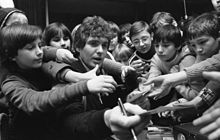Frank Schöbel
- View a machine-translated version of the German article.
- Machine translation, like DeepL or Google Translate, is a useful starting point for translations, but translators must revise errors as necessary and confirm that the translation is accurate, rather than simply copy-pasting machine-translated text into the English Wikipedia.
- Consider adding a topic to this template: there are already 9,160 articles in the main category, and specifying
|topic=will aid in categorization. - Do not translate text that appears unreliable or low-quality. If possible, verify the text with references provided in the foreign-language article.
- You must provide copyright attribution in the edit summary accompanying your translation by providing an interlanguage link to the source of your translation. A model attribution edit summary is
Content in this edit is translated from the existing German Wikipedia article at [[:de:Frank Schöbel]]; see its history for attribution. - You may also add the template
{{Translated|de|Frank Schöbel}}to the talk page. - For more guidance, see Wikipedia:Translation.

Frank Schöbel (born 11 December 1942, Leipzig, Saxony, Germany) is a German musician. He was one of the most successful pop singers in socialist East Germany (GDR), and has continued to perform even after German reunification.
Career
As the second son of an opera singer, his early musical talent was discovered. He started his career in the GDR as a musician, but also appeared as a presenter and entertainer in TV shows and played in DEFA (GDR-state film production company) films.
In 1971, he recorded "Wie ein Stern" (Like a Star), which appeared in the acclaimed 2007 film The Lives of Others. This single was a smash hit in East Germany, selling 400,000 records from East Germany's Amiga, and 150,000 from the West German record company Philips. Schöbel was invited as the first East German pop singer to appear in West Germany. He also had a hit in 1975 his children's Communist-sympathizing album We Paint a Sun, with, among other things, a song about Tokei-ihto. He sang the album's title song in 2005 with Lars Dietrich.
Schöbel joined at the opening ceremony of the 1974 FIFA World Cup in West Germany as a representative of the GDR in the Frankfurter Waldstadion.
Frank Schöbel was married to the actress and singer Chris Doerk, with whom he often performed in the 1960s and 1970s, and later to Aurora Lacasa.[1]
From the first marriage, he had a son, Alexander, and from the second marriage daughters Dominique (who's today a successful singer) and Odette. Together with his former wife Aurora and the two daughters, he took the LP family Weihnachten in Familie in one of the most important and best-selling albums of Christmas music of the GDR.
Schöbel continues to perform live, often with his ex-wife Chris Doerk.
Films
- Reise ins Ehebett (1966)
- Hochzeitsnacht im Regen (1967)
- Hot Summer (1968)
- Nicht schummeln, Liebling! (1972)
- Drei reizende Schwestern: Familienfest mit Folgen (1984, TV series)
- In aller Freundschaft (2007, TV series guest star)
External links
- Official Website
- Frank Schöbel at IMDb
References
- ^ "Frank Schöbel | Actor, Composer, Soundtrack". IMDb. Retrieved 2024-05-24.









